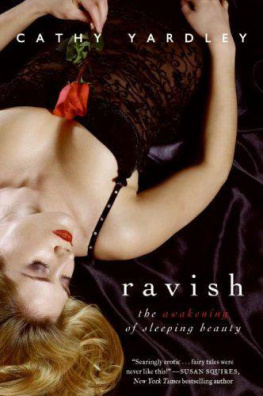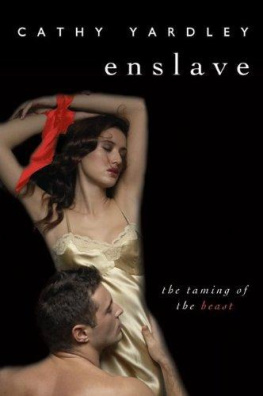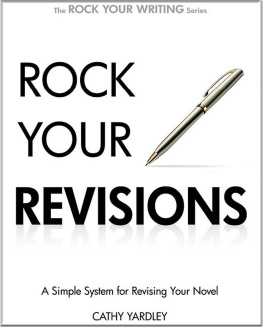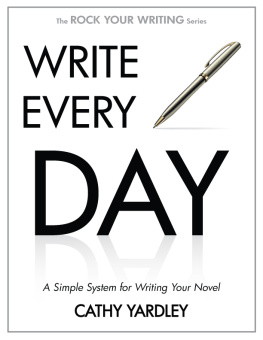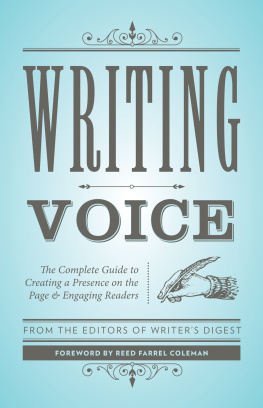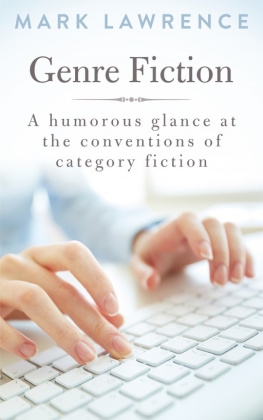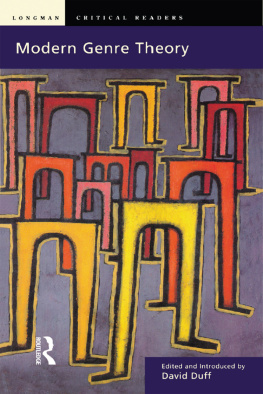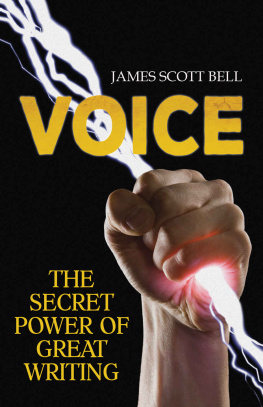PAINLESS PROMOTION: GENRE & VOICE
Figuring Out Your Genre and Finding Your Voice
By
Cathy Yardley
Painless Promotion: Genre & Voice
Content copyright Cathy Yardley Wilson 2014.
All rights reserved.
Published in the United States.
First Publishing Date November, 2014.
THE ROCK YOUR WRITING SERIES
Rock Your Plot
Rock Your Revisions
Rock Your Query
Write Every Day
Painless Promotion: Strategy
Painless Promotion: Genre & Voice
Contents
Part I. Genre
Why Genre Matters
Why does genre matter, anyway? In today's digital landscape, it's not like people are going through shelves and looking at labels. So why pigeon-hole yourself and your work? You write the books you love. Does it really matter how someone else categorizes it?
In a word: YES. Yes, it really does matter how your book is categorized.
If you're just writing a novel for yourself if you're going to be the novelist version of Emily Dickenson, with your books discovered after your deaththen you're absolutely right. Discovering what genre you're writing is a pointless exercise, because you have an audience of one, and you know exactly where that audience is.
But if you are writing with an eye towards making an income, you'll need to get readers outside your circle of acquaintance to read it. It becomes a matter of marketing, and you'll need to pay attention to genre, because genre is the first step towards being discovered by your future fan base. In fact, in today's digital landscape, it's even more important, because readers have literally millions of book choices at their fingertips, and they're drowning in information overwhelm.
Genre and sub-genre are how they're going to narrow down the scope and zero in on what reads, exactly, will fit their needs.
A few notes about genre:
1. There isn't an official "genre" organization that defines each genre. If you look in different bookstores, both bricks-and-mortar and online, you'll find slightly different terms and possibly slightly different categorizations under each name. What one might call "Mystery," another might call "Romantic Suspense." This is more art than science.
2. Thanks to cross-categorization, some things might technically fit in several places, or there might be overlap. These are often referred to as "cross-genre" novels.
3. There are a few "catch-all" genres, for those things that don't fit neatly in other places. "Mainstream" is a non-genre that's often used to describe something that's commercial, but doesn't fit neatly anywhere else.
4. If you don't get it right, it's not the end of your career. Today, it's easier than ever to adjust categories and genres, if need be. And defining your audience is going to be a big part of your publishing career, whether that's traditional or self-published. It will take you a while to triangulate on what you write best and who is most likely to be attracted to that.
With these caveats in mind, we move on to the first step: researching the possible genres.
The Genres and Sub-Genres
If you're going to figure out what you have, your first step is figuring out your range of options.
Let's say you're going out to dinner in a new town. There are various types of food you're interested in: Italian, Vietnamese, and Ethiopian topping the list. But you're not sure what is available in that particular town.
Before you can see where your book fits, you need to know what your potential choices are.
These definitions are my own descriptions for each genre. To be absolutely sure, I'd suggest researching genres yourself online or in physical bookstores, looking at the different genre-labeled work, and glancing through book descriptions to see what seems to be emphasized, especially in the successful (read: bestselling) novels.
Also, some of the categories may seem to overlap or have very fluid borders. You may wonder: is this a suspense with romantic elements, or a "romantic suspense"?
Right now, your job isn't to try categorizing where your particular story fits.
Right now, you're just familiarizing yourself with the landscape: what are the categories and what are the reader expectations?
A few points...
1) Read through the descriptions simply for reference.
Don't make a snap decision until you've read them all. (Obviously, if you've written a story about an eighty-year-old man trying to sell his soul to live forever and hes the only character, you probably don't have a romance, time travel, science fiction, Christian/Inspirational, or teen novel. That said, knowing what your story isn't can sometimes be as helpful as knowing what your story is .)
2) Obey the spirit of the description, not the technicalities.
If you read a description that says "mystery is about solving a murder" and you point out that your story is about solving a murderonly the solution is it was all a big misunderstanding, no one died, and the sleuth doesn't actually do any of the "solving" anyway. Yes, technically, that's a "mystery"but it ignores the reader expectations. It obeys the letter of the law, but ignores the actual purpose.
3) The best way to truly understand a genre, and its expectations, is to read it.
As an author, you should be reading voraciously, across all genres. That will help strengthen your understanding of the craft of fiction, as well as spark ideas for how to approach your own projects. Once you've narrowed down the field, the best way to see whether or not a story truly fits in a genre is to read about five bestsellers from that genre. Please note: these should absolutely not be the only books you read in this particular genre! And I'd also venture that if you've written a book in a genre you've never read, you may be miscategorizing it. I'll go into that more later, but for right now, the reason you're targeting five bestsellers is to see how traditional publishing and mass audience identifies that particular genre. The books won't all be the same (or at least, I hope not!), but they will all be popular (hence the sales). That will give you insights into what readers are interested in, in that particular genre, at this point. You'll also be able to see commonalities, which should underline reader expectations.
4) Genre readers are voracious in their own genre/sub-genres and are experts in their own right. Ignore their desires at your peril.
Some authors look at genre as a straightjacket. Some might argue that readers are more sophisticated, and that novels that deviate from classic genre constraints are welcome among some readers. That's true. That said, if you're going to start bending the rules, be sure that your novel at least suits one audience's expectations. For example, if you have a literary fiction with paranormal elements, as well as some science fiction trappings, be sure that the book satisfies at least one core genre audience. If it doesn't have enough wordsmithing and craft for lit fic, if your paranormal elements are haphazard, and your science fiction is implausible, you're going to satisfy none of your potential readerships. Finally, if you think you want to "elevate" a genrebe very, very careful. Take, for example, the romance genre. I have heard many literary writers say that they'd like to write a romance that "elevates" the genre, making it about more than simply "women looking for husbands" (or whatever) . For one thing, it shows a fundamental misunderstanding about the genre and its readers: people who want to "elevate" a genre are rarely people who read that genre. For another thing, it shows an arrogance and disrespect that, in my experience, never pays off with readers, no matter how tactfully its stated. To take something and enhance it is to elevate it. To ignore strictures and turn it into something you think that audiences ought to be reading is to court disaster. Choose a genre that better fits what you want to write, and which conforms to things you already enjoy reading.
Next page

